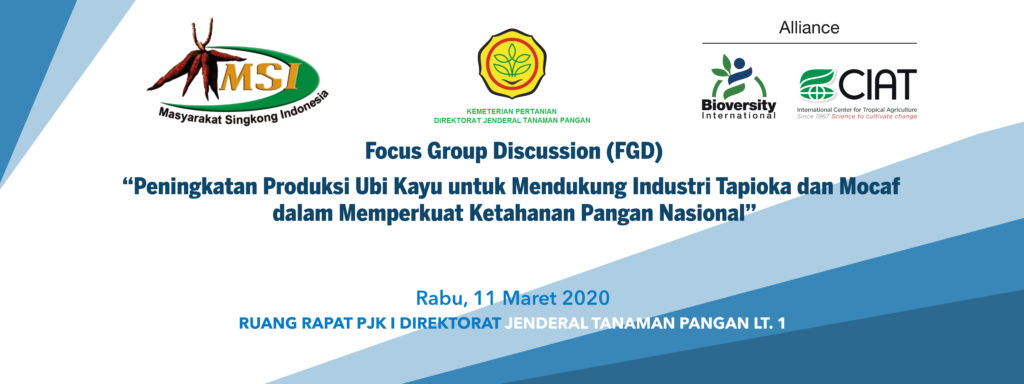National Policy Meeting - Jakarta

Date : Wednesday, March 11, 2020
Time : 9:00 - 15:00
Venue : PJK I Meeting Room Directorate General of Food Plants Lt. 1
Jl. AUP No. 3, Pasar Minggu, South Jakarta, 12520
PARTICIPANTS
Representatives from: (1) Ministry of Agriculture (Ditjen TP, BB Biogen, Balitkabi, BKP); (2) the Ministry of Cooperatives and SMEs; (3) LIPI; (4) Regional Agricultural Service; (5) Academics (UNEJ, ITB, UB); (6) Communities; (7) Industries; and (8) Small and Medium Enterprises. (Participant list details are attached).
Agenda
- Speech and Opening by Ir. Gatut Sumbogojati, M.M., Director of Processing and Marketing of Food Crop Products, representing the Director General of Food Crops: "National Cassava Development Policy in Supporting Tapioca and Mocaf Industries"
- ARAHAN DIRJEN TANAMAN PANGAN- Presented by Ir. Gatut Sumbogojati
- Dr. Ir. Yullantoro Baliadi, Director ILETRI: Ubi Kayu Untuk Bahan Baku Bioindustri (Not presented)
- FGDs delivered by 6 (six) speakers, namely:
- Prof. Ir. Wani Hadi Utomo, Project Leader of Balitkabi-Univ.Brawijaya-CIAT Cooperation: "Prospects for the Development of Cassava in North Sumatra and NTT"
- Prof. Dr. Achmad Subagio, University of Jember: "Cassava: The Future of Indonesian Bio-Industry"
- Ir. Arifin Lambaga, MSI Advisor: "Tapioca and Mocaf Standardization Increases Competitiveness in Domestic and Foreign Trade"
- Prof. Dr. Enny Sudarmonowati, LIPI: "Cassava Bioresources as Tapioca and Mocaf Raw Materials in Supporting National Food Security"
- Dr. Jonathan Newby, CIAT: "Strengthening Cassava Research Partnerships in Indonesia to Address Emerging Threats and Capitalize on New Opportunities"
- Ir. Hernawan Eddy Purnomo, Ayu Food: "Case Study of Mocaf Processing and Food Display Made from Mocaf Raw Materials"
- Discussion (question and answer)
- Closing of the FGD by reading the Recommendation
- The 3rd Conference of Indonesian Cassava Society (ICS)
(FGD and National Conference agenda details attached).
RECOMMENDATION FROM THE WORKSHOP
- Because cassava has an economic value of Rp. 100 trillion, including its derivative products, the government needs to include cassava plants in national strategic commodities. Related to this matter will be made specifically and submitted to the Minister of Agriculture and the President of the Republic of Indonesia.
- The government also needs to give priority to cassava in terms of research (as a National Research Priority covering upstream and downstream), development and implementation. The industry needs to play a greater role in collaborating with related K/L research institutions: Law on National Science and Technology No. 11, 2019.
- The need for the development of a national superior cassava seedling system. It aims to provide several superior seeds/varieties including Malang 4 to cassava farmers so that 40-60 tons/ha can be achieved. For this reason, it is necessary to establish centers for providing superior seeds, including tissue culture, to supplement seed sources from cuttings.
- In order for the assistance program of the Directorate General of Food Crops in 19 Provinces covering an area of 20,000 Ha with the largest area of 4,640 Ha in 2020 to have a more significant impact, it needs to be in one location of 200 Ha as a model of cassava pilot area from upstream to downstream with the concept of zero waste. Lampung is considered the most suitable because of the availability of land and several other supporting factors.
- Determination of location in the assistance program of the Directorate General of Food Crops is also needed a synchronization with off taker, so that efforts to increase cassava production can be guaranteed benefits for both farmers and industry.
- The need for government policies to maintain the stability of cassava prices and reasonable selling prices at the farm level.
- The need for SNI (Indonesian National Standard) obligation for tapioca and mocaf and other types of products. SNI that has been available for two tapioca and mocaf has expired, which is in 2011, whereas every 5 years must be renewed.
- In an effort to reduce the import of cassava, government policies are needed to support production, processing, and marketing as well as increasing export opportunities in the form of fresh, processed, and derivative products. The foregoing certainly needs coordination with related agencies.
- The need to enter the "one day no rice" program every Friday to reduce dependence on rice.
- The need to develop/introduce "smart rice" biofortified with protein from various beans (mung beans or gude beans) gradually.
- The need for an integrated movement to promote mocaf as a substitute for wheat through local governments throughout Indonesia.
- The need to increase awareness of Cassava Mosaic Disease in cassava which has now attacked cassava plants not only in Africa and India, but has also entered the Southeast Asian region.
- To realize the overall recommendations above, it is necessary to hold closer coordination, synergy and cooperation among all relevant parties.